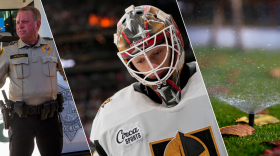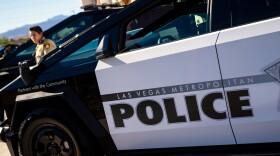It’s been one month of protests after the killing of George Floyd by Minneapolis police.
Protesters want changes to training, policies and practices at the Las Vegas Metropolitan Police Department.
The rallies have mostly been peaceful but there have been some that have turned violent. And at one protest on the Strip, a Metro officer was shot and paralyzed.
The man accused of shooting him wasn't part of the protest crowd but told police he came out of his hotel to see what was going on and fired at the crowd to get them to disperse.
That same night law enforcement officers shot and killed an armed protester downtown.
Undersheriff Kevin McMahill was at the scene the night that Officer Shay Mikalonis was shot. He told KNPR's State of Nevada that he had gone out to see what was happening at the protest first hand.
"I was immediately behind the SWAT vehicles that were deploying the gas on this group of protesters that had become violent," he said, "When we had gotten out right there at Circus Circus Boulevard and they were taking a number of individuals into custody and this individual shot Shay and hit him and obviously it went down right there on the corner of Circus Circus and Las Vegas Boulevard."
McMahill said officers were fired at two more times.
"It was chaotic. It was tragic," he said, "And unfortunately Shay continues to fight for his life. So, just ask your listeners to continue to pray for him and his family."
The undersheriff said he witnesses extreme professionalism from his officers during this and other protests.
The second shooting that night was not captured by body cameras. McMahill explained that officers assigned to that protest downtown were not regular patrol officers but firearms trainers, who are not equipped with body cameras.
He said he would love to have every officer on duty wearing a camera but it is too expensive.
One of the main messages from the protests that have swept the country is the idea of defunding police departments.
Supporters of the idea note that they are not calling for zeroing out police budgets, but instead, they're asking that funding be moved from police to social services to address calls for mental health services or homelessness.
McMahill agreed that over the years the failures of other social safety nets have often left police stepping in.
"I think this defund the police movement makes a lot of sense when it comes to funding other aspects of the social services system," he said.
However, McMahill said LVMPD just recently got back up to two officers per 1,000 people, which is the standard the department wanted to achieve.
He said LAPD and NYPD both have a ratio of four officers for 1,000 people.
The undersheriff said there needs to be a conversation about how to move funding and where the funding should go but policing is still valuable.
"I know that cops matter in these communities and I know that what police do matters and I think it is very important for us to have an intelligent conversation about what the future of policing looks like so that you don't completely allow yourselves to descend into a lawless society," he said.
He said the majority of people he has talked to - in white communities and communities of color - support police in their communities.
The department was strongly criticized after one protest where a number of legal observers were arrested. Legal observers are trained attorneys and law students who are there to document the protest and offer help to protesters who are arrested.
There have also been instances of journalists, including a photographer from the Las Vegas Review-Journal, being arrested while covering the protests.
McMahill defended the actions. He said there were some people wearing legal observer T-shirts who weren't actually legal observers. He also said some journalists didn't identify themselves.
“When a dispersal order is given and you are participating and you find yourself in a place where you are arrested to come up and then immediately identify yourself as a journalist - after you’ve already been taken into custody - I think sort of convolutes the issue to say that we knew that they were journalists ahead of time,” he said.
He noted that just because someone is a journalist or a legal observer doesn't give he or she the right to break the law.
McMahill did say the department has been working with various groups to better manage the protests. Individual commanders now speak with the organizers so protesters can rally, which is a right guaranteed by the Constitution, but not get into conflicts with police officers.
The undersheriff said extremist - from both the left and the right - have come to the protests with the intent to disrupt. He said the organizers of one of the largest Black Lives Matter rallies at Kianga Isoke Palacio Park earlier this month worked with police to remove agitators.
“I believe our organization, and I only speak for Metro, but our organization we’re not against protests," McMahill said, "We’re not against protests that target the police. We realize that the actions of Officer [Derek] Chauvin were not only criminal but reprehensible. The reality of it is though if we don’t have real conversations. Protests are designed to bring about change, societal change, riots are to bring about anarchy and chaos. They don’t resolve and they don’t cause anything but further conflict between the police and the people that we police.”
McMahill believes the protests and unrest are likely to continue through November. He believes lawmakers need to take a serious look at police reforms.
“If Congress and state legislatures can’t come to some agreement on what police reform looks like, as well as the trials of these officers that have been arrested in a number of states, I think that this social upheaval will continue and all I can hope is that cooler heads will prevail as we work together to keep these protests peaceful,” he said.
As the country talks about police reform, police unions have come to the forefront as a stumbling block to changes.
Unions can stop departments from getting rid of officers they believe have used excessive force. McMahill said it is an issue police chiefs around the country are grappling with.
Nevada, for instance, has an Officer Bill of Rights. The department tried to get it changed but McMahill said it hasn't had much luck making the changes necessary to get rid of officers they don't believe should be there.
He said the unions only have the power lawmakers have given them.
“It is sort of an interesting point to me to hear that everybody wants all of this police reform and then the laws that get passed aren’t helpful to the organization in that police reform,” he said.
He also said a bill called SB242, passed and signed last year, hurts efforts to reform police policies. The bill allows an entire case against a police officer to be tossed out if any piece of evidence is wrongfully obtained.
Besides police reform, McMahill believes more needs to be done to overall the entire justice system.
"I don't believe the conversation should focus solely on police reform," he said, "While I agree there should be a conversation around police reform, I still think there is a much larger conversation that needs to be happening when you talk about disparate sentences for black and brown people and the whole host of other issues that are out there that are not solely the responsibility of police."
When the video of a Minneapolis police officer kneeling on the neck of George Floyd first surfaced, many people asked why the other officers on the scene didn't intervene.
Caller Melissa asked McMahill directly if the police would be policing each other and calling out bad behavior.
He pointed out that Minneapolis didn't have regulations against the maneuver used by Officer Chauvin against Floyd, but Las Vegas Metro Police has had policies in place against chokeholds for decades.
McMahill also said that 10 years ago Metro Police instituted a number of reforms, following an investigation by the Department of Justice.
The reforms included putting sanctity of life language into the use of deadly force policy, de-escalation training, and duty-to-intervene language in department policies.
He also said that of the eight recommendations outlined by the NAACP, Metro has instituted six and is looking at a seventh. He said some departments haven't instituted any.
However, the undersheriff admitted that policies don't change culture.
"Leadership is what changes culture," he said, "The sheriff and I are very committed to making sure that Metro is held in the regard that we believe that it should be and ensuring that not only do we change policy but that we change the culture."
McMahill said the department has made mistakes and is likely to make mistakes in the future, but he said they're committed to learning from those mistakes and hold officers accountable.
With all that has happened over the past few months, McMahill said he had to take some time to reflect.
"The truth is after Shay was shot, I had a really hard time understanding that the officers' actions in Minnesota could result in my officer being shot and paralyzed," he said, "I needed to take a little bit of break myself and so I did."
McMahill said he has spent 15 years or more trying to bridge the divide between police and communities of color. And he's learned that for all that effort and progress he's made, "it's something that never goes away."
"I was talking to an African American the other day, he says, 'My skin color never goes away.' It sort of re-energized me in the sense that we have to double-down on the community effort. We have to double-down on our ability to go back out and make people believe and trust in the police because we've always said - we can't do it alone."
Undersheriff Kevin McMahill, Las Vegas Metropolitan Police Department










